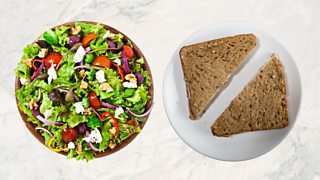The taste of music: seven ways in which melody seasons our meals
In the latest Food Programme episode Music and Food: Delicious Interplay, we meet a chef who credits the stripped-back simplicity of his cooking to the minimalist punk perfection of ‘Ever Fallen in Love’ by the Buzzcocks. Then there’s the writer who claims that the maniacal Pixies song ‘Debaser’ heightens the punchy flavours of Duvel – a strong Belgian beer named after the devil.
Inspired by the fascinating relationship between tunes and taste buds, here are seven more pairings of music and food that might surprise you.

-
![]()
The Food Programme
Listen to Music and Food: Delicious Interplay
1. Music can influence you to spend more
When we sit down to enjoy a meal in our favourite restaurant, we don’t tend to give too much thought to the music playing in the background. But “retail atmospherics” is big business; research has shown that an ostensibly harmless soundtrack can actually determine how much we spend on a night out.
Academics at the University of Leicester claim that the genre prompting us to dip into our purses more than any other is classical music. According to Dr Adrian North, “It has got all sorts of connotations of sophistication, affluence and wealth, and it makes you feel a bit posh. In a restaurant, this has the effect of making you spend a bit more money.”

2. A lower volume encourages healthier eating
Dr Dipayan Biswas from the University of South Florida believes that the volume of music playing in a café impacts on the food we choose. His research reveals that a quiet soundtrack – anything below 55 decibels – encourages us to make mindful, considered and ultimately more healthy dietary choices.
However, we are 20% more likely to reach for sweet and greasy food when we’re exposed to 70 decibels or more. Biswas claims that loud music is a stimulant that incites stress and agitation; when we’re in such a state, the instant hit of sugar, salt and fat is far more appealing than the healthy stuff.
3. Music can enhance the flavour of wines
Our capacity to register and interpret taste is influenced by environmental conditions – such as sound. Charles Spence, professor in experimental psychology at Oxford University, has discovered that music can actually alter our perception of whatever it is we’re consuming. Interviewed on The Food Programme, he states that while music cannot “create flavours out of nowhere”, it can “draw people’s attention to something in their tasting experience.”
In particular, Spence has found that music, when chosen correctly, can enhance the flavours of wines. Based on his observations, we’ve put together some playful recommendations.
• Sweet wines should be paired with a piece of “piano music” with an “even rhythm, slow tempo and high pitch.” With this in mind, you could try matching a Riesling grape with Chopin’s Waltz no. 2 op. 64.
• Alternatively, the opening bars of the Star Wars Overture would accentuate the saline complexity of a Fino sherry.
• However, if you prefer a high-tannin Cabernet Sauvignon red wine, only the pomp-rock majesty of Muse’s ‘Exogenesis: Symphony’ will do. Wait for the crashing guitar to come in to really stir up those distinctive, full-bodied aromas.

4. How sweet or bitter something tastes can be enhanced
Charles Spence’s research has also revealed that sugary tastes are amplified by high pitched music, while bitterness is teased out by lower frequencies.
We are 20% more likely to reach for sweet and greasy food when we鈥檙e exposed to loud music at a volume of 70 decibels or more.
This is not just quirky science; it has fascinating real world applications. Some restaurateurs with a social conscience are already exploring how to reduce the sugar content of cakes and pastries without compromising their taste. If lower sugar levels could be boosted by a ‘sweet’ soundtrack, the delicious treats would remain just as tasty. Yes please!
5. Atmospheric sounds when you eat
Every course chef Heston Blumenthal serves at his restaurant The Fat Duck plays out like a live performance. For this renegade chef, even the printed menu is part of the experience; he claims that a spiky font heightens the taste of an acidic dish.
But Heston dabbles with sound too. His sashimi arrives at the table accompanied by a set of headphones. Customers consume the raw seafood delicacy while listening to the sound of crashing waves and children playing.
6. Why food tastes worse on planes
Not all music flatters our palette. Indeed, some sounds need to be blocked out before we can enjoy our food.
The loud drone of an aeroplane engine has a detrimental effect on our taste buds. This is because white noise at 89 decibels or above has been proven to deaden our capacity to register certain flavours.
So, the next time you’re about to turn your nose up at aeroplane food, remember that the little plastic tray of clammy, lumpen gruel might not be as anodyne as you think. Just put on a pair of decent ear defenders and your meal will transform into a mile-high taste sensation.

7. Does your food react to music when it's growing?
The vintners at Barahonda vineyard in Spain believe that music can have an impact on the wine-making process itself. One of their reds – a mix of monastrell, petit verdot and cabernet sauvignon grapes – is subjected to a 60-hour musical playlist while it matures. The soundtrack includes renowned Malian singer Fatoumata Diawara and Iceland’s brooding symphonic rockers Sigur Rós.
Inspired by the idea that babies in the womb are shaped by the sounds that surround them, Sonia Garcia of Barahonda says, “we decided to play music to the wine when it was in the bottle to soften and sweeten the tannins." This is probably no more than a novel PR exercise, but the next time you crank up the tunes and start dancing around your kitchen, spare a thought for what you’re doing to your wine collection.

-
![]()
The Food Programme: Music and Food
Dan Saladino speaks to chefs and scientists about the relationship between tunes and taste.
-
![]()
Mouthwatering African food that you have to try!
-
![]()
Break out of the lunchtime automatic pilot and eat something that tastes good!
-
![]()
Spicy or mild? We take a closer look at classic curry house fare.




